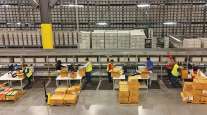Senior Reporter
Record Number of Workers File for Unemployment Benefits

[Stay on top of transportation news: Get TTNews in your inbox.]
A record 3.3 million Americans filed for unemployment benefits after the coronavirus outbreak forced the shutdown of major industries, small businesses and gig workers.
The Department of Labor announced March 26 that the claim amount — filed the previous week — is a surge from 282,000 the week before.
The previous record was 695,000 in 1982 during the recession.
Unemployment Insurance Weekly Claims
Initial claims were 3,283,000 for the week ending 3/21 (+3,001,000).
Insured unemployment was 1,803,000 for the week ending 3/14 (+101,000).https://t.co/ys7Eg5LKAW — US Labor Department (@USDOL) March 26, 2020
The economic damage caused by the coronavirus has been dramatic, as just last month the unemployment rate was 3.5%, a nearly 50-year low, after adding 273,000 new jobs.
Rajeev Dhawan, director of the Economic Forecasting Center at Georgia State University, said the numbers will get worse.
“Last week is when the layoffs started. This is just from the last one week. It’s a given; it’s a bad drop,” he said. “This week is when the full impact is coming. It takes a while.”
Dhawan also said the hospitality industry is being hit disproportionately because many of those employees often work at more than one business.
“You may get laid off at one restaurant, and then the other,” Dhawan said. “They work at multiple places, but in the data, it’s counted as two jobs, but it’s only one person.”
The Labor department’s report was announced just hours after the U.S. Senate unanimously passed a $2.2 trillion relief bill to aid businesses, workers and health care systems engulfed by the coronavirus pandemic.
“This is a proud moment for the United States Senate and for the country, and we’re going to win this battle in the very near future,” said Senate Majority Leader Mitch McConnell (R-Ky.).
Federal Reserve Chairman Jerome Powell said the central bank will have enough tools to keep the country running until the coronavirus begins to subside.
“We’re trying to create a bridge from a very strong economy to another place of economic strength,” Powell said during a television interview. “That’s what our lending does.”
Since the beginning of March, the Fed has lowered its benchmark lending rate to near zero and taken other measures to provide funds to businesses and keep credit markets open.
Still, economist Noel Perry, with Transport Futures, said the spreading virus is the type of unplanned event that can derail an economy.
“The second quarter is done for because the probability of the politicians letting activity begin again is small,” Perry said. “From an economic standpoint, the second quarter is toast.”
Perry forecasts the nation’s gross domestic product could drop by as much as 10% in the second quarter. “It became clear that the rapidly escalating containment strategies being implemented by a number of states already were having extreme effects on employment, production and consumption for the U.S. economy,” he said.
But even as the economy is shedding jobs at a record rate, Walmart and Amazon.com said they are adding a combined 250,000 positions to keep up with demand.
FTR Intelligence said March 23 it revised its projection for second-quarter GDP to an 11% contraction. It predicts the economy should begin to recover in the third quarter with a 5.1% level of growth.
Trucking has seen an upturn, too, as drivers rush the supplies that fill grocery stores, hospitals, pharmacies and other critical businesses. But Stephen Burks, an industry economist at the University of Minnesota-Morris, told Transport Topics that trucking likely will see a slowdown, too, as the rest of the economy deals with the lingering effects of the coronavirus.
“I think the big question is whether … the current spike can sustain itself, and my opinion is, it’s probably going to be a short run,” Burks said. “There’s been enough effect, contracting parts of the economy, that overall freight demand has to drop at some time. But that will be mitigated somewhat by the change in the freight mix.”
Want more news? Listen to today's daily briefing:




